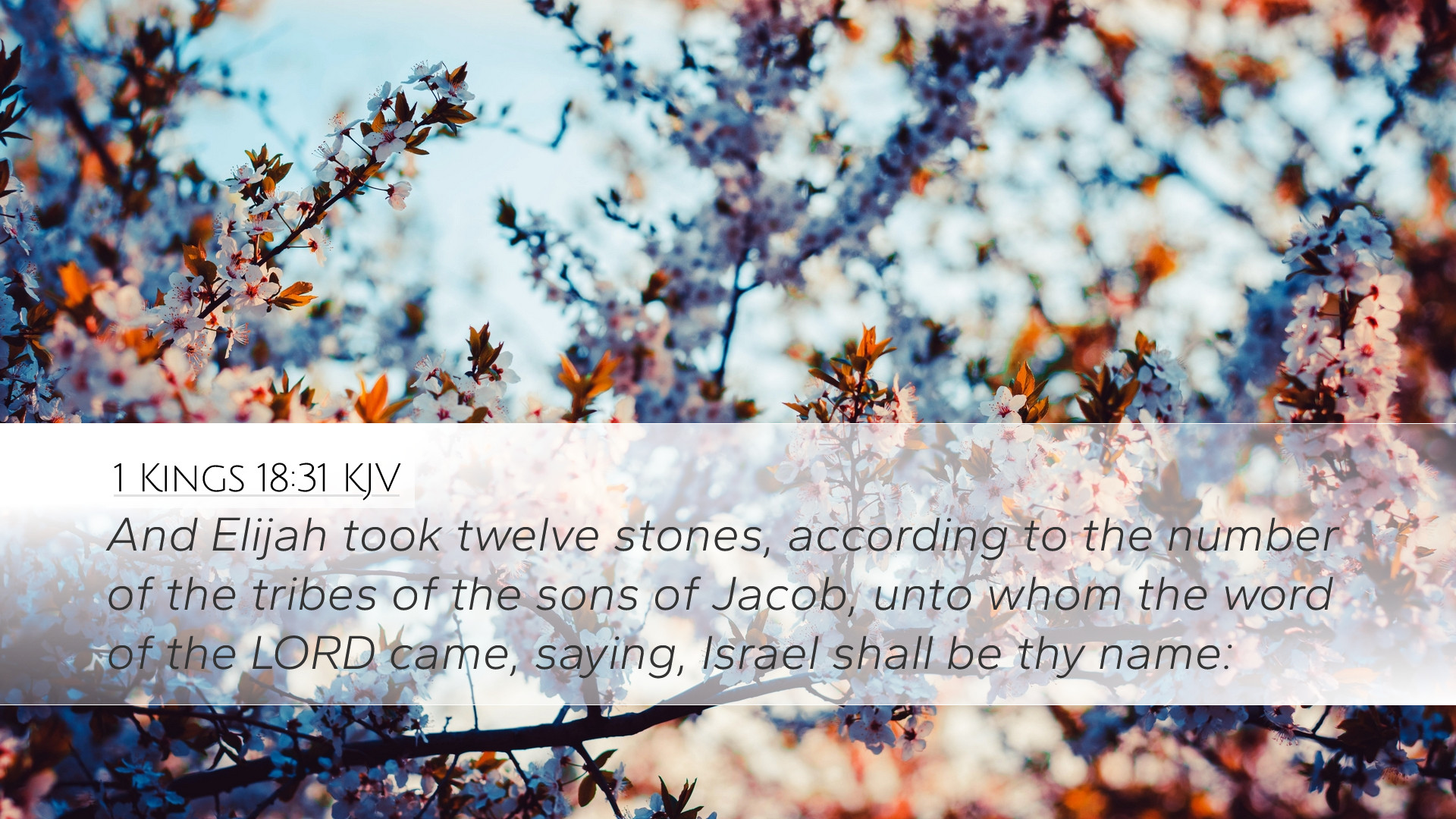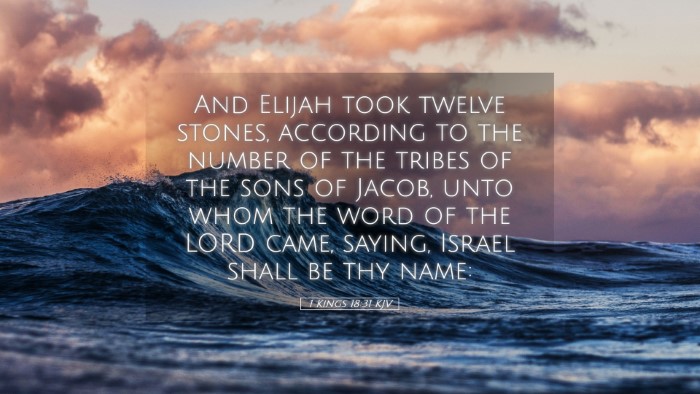Commentary on 1 Kings 18:31
1 Kings 18:31 states: “And Elijah took twelve stones, according to the number of the tribes of the sons of Jacob, unto whom the word of the LORD came, saying, Israel shall be thy name.” This verse occurs during a pivotal moment in the narrative where the prophet Elijah confronts the prophets of Baal on Mount Carmel.
Historical Context
Elijah's actions are steeped in the history of Israel. The nations of Israel and Judah had suffered under the reign of wicked kings, particularly Ahab, who promoted Baal worship and led the nation astray. This confrontation serves as a dramatic call back to the covenant relationship God had established with His people.
- The Twelve Stones: The use of twelve stones is significant as it represents the twelve tribes of Israel, emphasizing unity and God's enduring covenant with His chosen people. Each stone symbolizes a tribe, thus restoring and reaffirming Israel's identity and heritage.
- Jacob's Legacy: Reference to Jacob connects the present situation to the patriarchal roots of Israel, reminding the audience of God's faithfulness throughout their history.
Theological Implications
This verse signifies God's sovereignty and the importance of proper worship. Elijah's act is not just a challenge to the prophets of Baal but also a restoration of true worship in Israel. It brings forth several key theological themes:
- Return to Covenant Faithfulness: Elijah’s actions remind the Israelites of their covenant obligations to God, calling them to renew their commitment to Yahweh.
- Unity Among Tribes: The unity represented by the twelve stones is a call for the fragmented nation to come together under God's rule.
- Divine Identity: By invoking the name of Israel, Elijah is reminding the people that their identity is rooted in God’s promises, which stand in contrast to the false gods.
Insights from Key Commentators
Matthew Henry:
Henry emphasizes the symbolic act of using twelve stones as an invitation for the people to remember their heritage and the grace of God in their history. He argues that the twelve stones serve to reinforce the notion that God is not only the God of individuals but of the community of Israel as a whole. Henry notes that this act was pivotal in calling the nation back to God.
Albert Barnes:
Barnes focuses on the significance of Elijah’s method in rebuilding the altar with stones. He asserts that the twelve stones illustrate the unity of God’s intended people and their diverged path due to apostasy. Barnes interprets this as a symbolic gesture that sought to awaken the people from their spiritual lethargy and encourage a return to Yahweh. He underscores that the act of highlighting the tribes serves to call for genuine worship from an undivided heart.
Adam Clarke:
Clarke provides a detailed analysis of the historical implications of the twelve tribes and comments on the deeper meaning behind Elijah’s choice. He suggests that rebuilding the altar of the Lord with these stones was a means of invoking God's presence and favor, which had been obscured by the worship of Baal. Clarke remarks that this act of construction was central to the narrative as it represents a physical and spiritual act of dedication and restoration of God's altar.
Applications for Contemporary Faith Communities
In light of 1 Kings 18:31, there are several lessons that modern readers, pastors, and theologians can glean:
- Call to Unity: The church today must strive for unity amid diversity, recalling that all believers are part of the body of Christ, akin to the twelve tribes of Israel.
- Need for Genuine Worship: Worship must be directed towards the true God, and pastors are tasked with ensuring that the congregation aligns itself with scriptural truths rather than cultural trends.
- Restoration and Renewal: This verse challenges contemporary believers to consider their own hearts and communities, encouraging a return to God in light of His covenant promises.
Conclusion
1 Kings 18:31 serves as a powerful reminder of the faithfulness of God and the importance of returning to Him amidst societal pressures and distractions. The prophetic act of Elijah in using twelve stones conveys profound truths about identity, community, and commitment. For pastors, students, and scholars alike, this verse is an invaluable source of insight into the nature of God’s covenant relationships and the call to worship Him in truth and spirit.


